In the history of Europe, feudalism was everywhere in the Middle Ages, and the power of kings was extremely weak. The feudatories, like the king, considered themselves almost independent, exercising many powers. The states did not have independent authority, were considered a part of Christendom and were controlled by the Pope. But in the fifteenth-sixteenth century, due to the Renaissance and the Reformation, the feeling of nationalism developed, which announced the end of the Middle Ages and the modern era. Due to intellectual, social and economic reasons, the power of the feudal lords ended, the power of the church also weakened, which opened the doors for the development of the modern state. At the beginning of the modern era, while new competing monarchies such as Spain, France, England, Portugal and Scotland emerged in Western Europe, on the other hand, Germany, Italy, Bohemia, Poland, Sweden, Norway, Germany, Italy, Bohemia, Due to their underdeveloped systems, Denmark, Turkey, Russia, Lithuania etc. could not become as organized and strong as the nations of Western Europe. Thus the flourishing of national states is a great feature of the modern era.
Causes for the rise of national monarchies
The rise of autocratic national states in Western Europe in the early sixteenth century was due to-
The Fall of Feudalism
The main feature of medieval Europe was the feudal system. The feudatories gradually increased their power and started ruling like small states. In fact, the feudal people were small kings who used to fight with each other. Not only this, he also used to decide war with the king. The influence of the feudal lords was so great that the 'War of Roses' in England lasted for thirty years Keep going The condition of the peasants was also very deplorable, exploitation had reached its climax. The common man was greatly affected by the feudal system and was trying for the downfall of feudalism. When the rulers increased their power to suppress the feudal system and started campaigns against the feudal lords, direct contact was established between the people and the king. Feudalism declined due to the support of the king by the people. Thus the power of the king increased, which paved the way for the establishment of autocratic monarchies.
Trade-Commerce Evolution
The commercial revolution also played an important role in the rise of the autocratic monarchy. Due to the mercantile policies, the kings got a lot of money, which they could use to organize the army and expand their political power. The expansion of trade also fueled the need for a strong government. With the advancement of trade-commerce, the socio-economic condition of the middle class got strengthened , The middle class gave a lot of active support in the establishment of a strong monarchy for the upliftment and security of its trade and commerce. The middle class did great service to the monarchies against the feudal lords and created a sense of nationalism. In return, the kings provided protection to trade and commerce.
Rise of the middle class
The rise of the middle class proved to be very important in terms of the decline of the feudal system. In the beginning of the sixteenth century the social and economic condition of the middle class became very strong. This budding middle class supported the monarchy for the development and security of its trade and commerce. The kings also got the sympathy of the middle class by providing protection to trade and commerce. Not only did this lead to the establishment of colonies, but the enlightened class also contributed significantly to the development of the spirit of nationalism. In the words of Hage, 'The development of the middle class and its close relation to the monarchy was perhaps the most important and most important factor in the transition from the Middle Ages to the Modern Age.'
Reformation Movement
By the end of the medieval period, many faults had arisen in the Church and the Pope began to interfere in the political sphere as well as in the religious sphere. But due to the advent and renaissance of the modern era, the people of Europe had become rationalist. He opposed the impiousness, corruption and luxury of the Pope. The rulers of Western Europe, who were opposed to papal authority for political reasons, took advantage of the public sentiment and strongly opposed the papal authority. Some European countries actively cooperated in the development of the Protestant movement. As a result of the Reformation movement, the unity of the Catholic Church was dissolved and the church was completely under the king , This increased the honor and prestige of the king and strengthened the feeling of nationalism.
Development of a sense of nationalism
The feeling of nationalism was one of the main reasons for the rise of monarchies. Crusades, Renaissance, Reformation and indigenous literature strengthened the spirit of nationalism. The disintegration of the monasteries increased the income and power of the national states. The civilization which was earlier religious, now it has become national. Due to the feeling of national pride and respect, the people made the kings powerful. Trade and the establishment of colonies in distant territories across the seas required powerful seafarers and military power, which only a powerful monarchy could provide. Now trade and colonies also became symbols of national pride, which strengthened the strong monarchy.
innovate
New inventions in the Renaissance period made a special contribution to the rise of monarchies. Invention of gunpowder, use of guns, changes in wartime, discovery of new colonies and invention of printing press From this point of view proved to be very effective weapons. In the face of gunpowder and guns, the fortresses of the feudatories and their cavalry proved to be in vain, leading to the rise of powerful kings.
Theory of Divine Origin
The theory of the divine origin of the state also made a major contribution to the development of an absolute monarchy. Some learned writers of the Revival and Reformation period also helped in strengthening the monarchy. Italian author Machiavelli His book 'The Prince' He established the principle that the object of the state should be the protection of person and property. He was of the view that democracy was not sufficient to perform these functions and this type of security is possible only in an autocratic monarchy. French author Bodin in his treatise 'The State' In explaining the principle of sovereignty, he said that the power of the sovereign should be unlimited. He said that the king is the source of all laws and he is answerable only to God. Similarly English writer Hobbs called 'Leviathan' Supported a powerful autocratic monarchy in a book called.
Dominant autocratic monarchies and their development
The decline of feudalism, the growth of trade-commerce, the rise of the middle class, the religious reform movement, the development of national spirit, innovations and the principle of divine origin of the king contributed to the development of autocratic monarchies. Opened the door. Now the major countries of Western Europe, which included Spain, France, England, Portugal and Scotland, started on the path of development of autocratic national monarchy. Some of the major national monarchies of the modern era are described as follows-
Spain
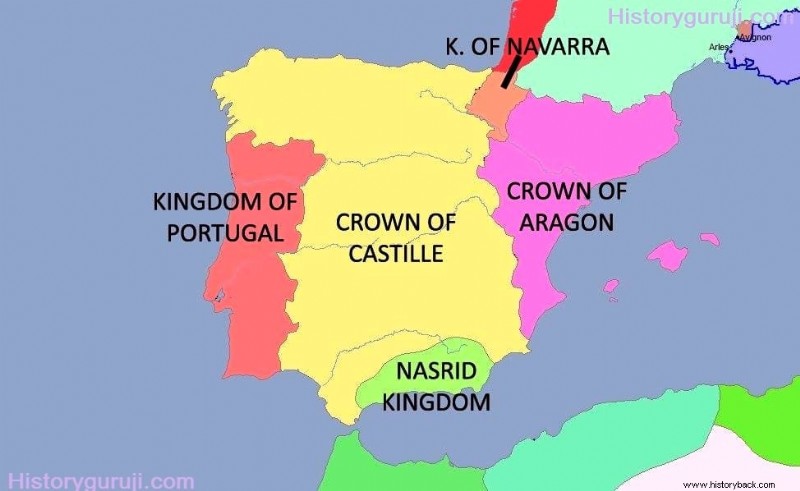
Pyrenees Mountains South of the Mediterranean Sea, Atlantic Sea And the plateau area surrounded by Portugal is Spain. Before the fifteenth century, Spain had no political unity and was divided into several regional states. Moore Muslims, who lived in North Africa in the 8th century, occupied Spain and forced the residents there, who were Christians, to take refuge in the mountains. But after a long period of unification efforts, Christians established their authority in the rest of Spain except Grenada by the 15th century. Thus the rise of the national monarchy in Spain at the beginning of the sixteenth century was possible.

Spain was mainly two major states until the end of the fifteenth century. Was divided into - one, Aragon and the other, Castile , Marriage between Prince Ferdinand of Aragon and Princess Isabella of Castile in 1479 AD Happened. As a result of this marriage, the kingdoms of Aragon and Castile were united, which led to the political unification of Spain. Grenada was the only state that was under the Moors. Ultimately in 1492 AD the combined forces of Ferdinand and Isabella defeated the Moors and captured Grenada have done. With this Spain attained complete religious and national unity. Now Spain became a fully independent nation.
It is noteworthy that in the 14th and 15th centuries, in the Christian world, which was occupied by the increasing influence of the Turks, where the influence of the Muslims was increasing in the east and the capital of the empire, Vienna was also not safe, Whereas in the west, Spanish soldiers put an end to the centuries-old influence of Muslims and re-established Christian influence.
Ferdinand &Isabella
The pair of Ferdinand and Isabella adopted a policy of concentrating all political rights of the state and establishing religious unity in the entire state for the establishment of an autocratic monarchy in Spain. He established a powerful central government for the glory of the kingdom. He abolished the power of independent cities, suppressed the arrogant independent feudal lords and established peace and order in the state. Ferdinand took trade-commerce under state protection and suppressed the robbers and increased the means of trade-commerce and transportation. Powerful fleets were built that led to the establishment of colonies.
Ferdinand and Isabella also understood the importance of religious unity for national unity. He expressed allegiance to the Catholic Church, to which Pope Alexander VI pleased him 'Catholic Emperor' Designated with the title of. The Pope accepted that the appointment of church officials in Spain would be in the hands of the King of Spain. 'Inquisition' Or religious courts were established, which punished the anti-religionists. Through this many opponents were executed and Muslims and Jews were expelled from Spain.
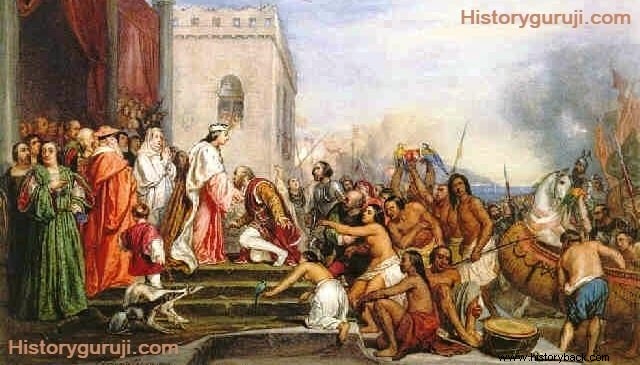
Spain has sought to establish its important position in European politics. He turned his attention to foreign and colonial expansion. 1492 AD Columbus's discovery paved the way for the establishment of the Greater Spanish Empire in the New World (America). Soon Spain's dominance over most of America was established. Gold and silver were in abundance in these regions. In the form of America, Spain got such a tree, which at the beginning of the modern period made Spain one of the most powerful and advanced countries of Europe.
Ferdinand married his second daughter, Maria, to the ruler of Portugal, his eldest daughter Joanna, to improve Spain's relations with Portugal, Austria and England.> Married to Prince Philip I of Austria, and his younger daughter, Catherine, to Prince Arthur of England, and after Arthur's death to Henry VIII. These marriages led to an unprecedented increase in the influence of Spain. In this way, Spain maintained its influence even though it was not equal to France in terms of population and domestic resources.
The final step for the unification of Spain was taken in AD 1512, when Spain defeated France and occupied Navarre. Thus the unification of Spain became possible as a result of the joint efforts of Isabella and Ferdinand. Now Spain has gained an important place in European politics.
Charles I (1516-1556 AD)
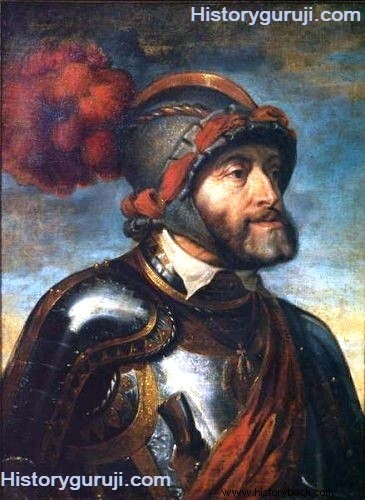
Ferdinand's eldest daughter's son after death Charles I (1516-1556 AD) He sat on the throne of Spain. In 1519 AD, Charles I was elected emperor of the Holy Roman Empire. As Holy Emperor he was called Charles V. In addition to Spain, he ruled the Holy Roman Empire, the Netherlands, Burgady, Naples, Sicily, Sardinia, the whole of Spanish America, the Philippines and parts of Africa. Spain reached the height of its glory during the reign of Charles. But this pride of Spain could not last.
इंग्लैंड

इंग्लैंड में राष्ट्रीय एकता एवं राष्ट्रीय सरकार की स्थापना का कार्य पश्चिमी यूरोप के अन्य राज्यों की अपेक्षा अधिक तेजी से हुआ। 1337 से 1453 ई. तक फ्रांस और इंग्लैंड के बीच हुए दीर्घकालीन सामंतीय एवं राजवंशीय युद्धों (शतवर्षीय युद्ध) के परिणाम बड़े महत्वपूर्ण सिद्ध हुए। प्रारंभ में तो इंग्लैंड को सफलता प्राप्त हुई, किंतु अंततः इंग्लैंड को पराजय का मुँह देखना पड़ा। शतवर्षीय युद्ध के समाप्त होने के दो वर्ष पश्चात् ही इंग्लैंड को भयंकर सामंती युद्ध, जिसे इतिहास में ‘गुलाबों के युद्ध’ (1455-1485 ई.) के नाम से जाना जाता है, की भयंकर ज्वाला में जलना पड़ा। यह गृह युद्ध यार्क राजवंश, जिनका प्रतीक श्वेत गुलाब था और लंकास्टर राजवंश, जिनका प्रतीक लाल गुलाब था , के सामंतों व उनके अनुयायियों के बीच लड़ा गया था। यह संघर्ष 1485 ई. में समाप्त हुआ जब लंकास्टर वंश की ओर से सिंहासन के दावेदार हेनरी ट्यूडर को वासवर्थ के युद्ध में निर्णायक विजय मिली .
हेनरी सप्तम
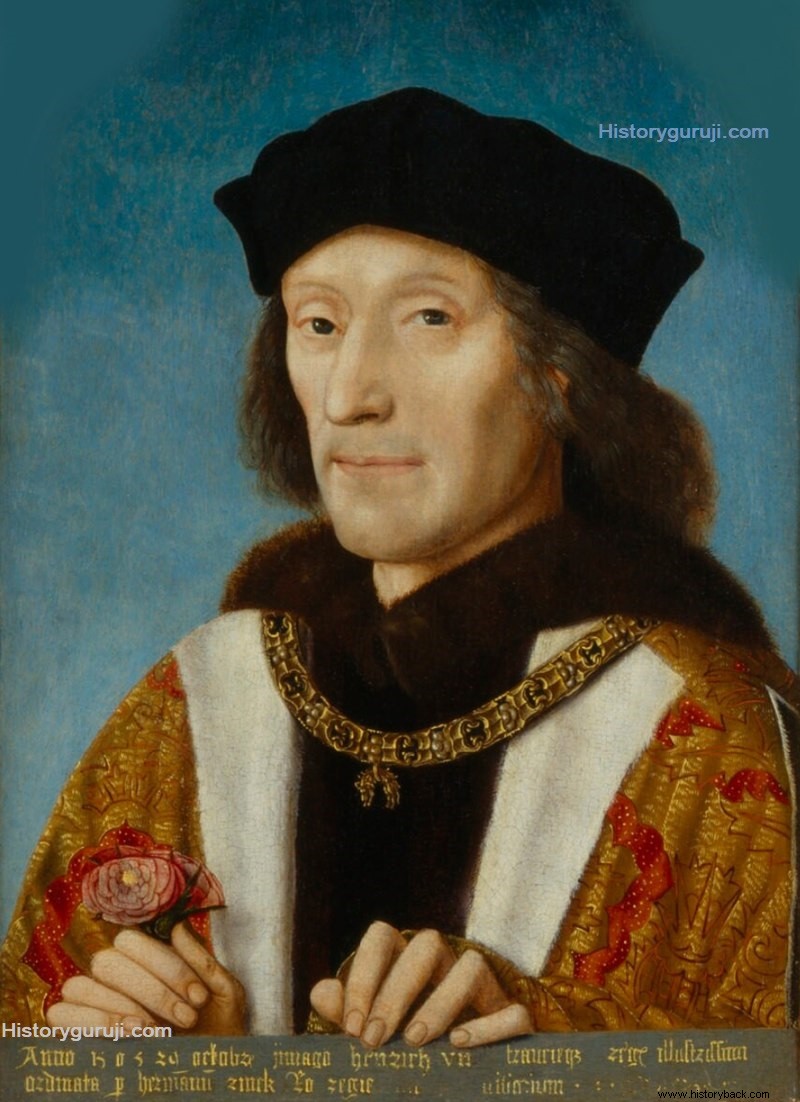
हेनरी ट्यूडर 1485 ई. में हेनरी सप्तम (1485-1509 ई.) के नाम से इंग्लैंड के सिंहासन पर बैठा और एक नये राजवंश ‘ट्यूडर वंश’ (1485-1603 ई.) established. हेनरी सप्तम ने इंग्लैंड में न केवल एक शक्तिशाली राजवंश की स्थापना की, वरन् इंग्लैंड के समाज में व्याप्त मध्ययुगीन कुरीतियों एवं अंधविश्वासों, सामंती अत्याचारों से मुक्तकर उसे आधुनिक युग में प्रविष्ट कराते हुए बौद्धिकता एवं तर्कवादिता के पथ पर अग्रसर किया। यही कारण है कि उसके शासनकाल को इंग्लैंड के इतिहास में ‘बीजारोपण एवं सुधारों का समय’ called.
गुलाब के फूलों के युद्ध से हेनरी सप्तम् को दो बड़े लाभ हुए- एक तो इस युद्ध के परिणामस्वरूप इंग्लैंड में अनेक शक्तिशाली तथा प्रभावशाली सामंतगण मारे गये, या अशक्त हो गये। हेनरी ने विभिन्न अधिनियमों के द्वारा सामंतों का दमन किया, उनसे सैन्य-अधिकार छीन लिये तथा सामंतों के स्थान पर मध्य वर्ग के लोगों को ऊँचे पदों पर नियुक्त किया। इस प्रकार उसने इंग्लैंड में सामंत-तंत्र को हमेशा के लिए समाप्त करके निरंकुशता को परिपुष्ट किया। दूसरे, हेनरी द्वारा सामंतों के दमन से एक नये वर्ग अर्थात् मध्यवर्ग को जन्म हुआ, जिसने अपने हितों के लिए राजा का साथ दिया। इसी जन-समर्थन के आधार पर ट्यूडर राजाओं ने सोलहवीं शताब्दी में निरंकुश राजतंत्र स्थापित किया।
हेनरी सप्तम ने एक ओर एलिजाबेथ से विवाह करके गुलाब के फूलों के युद्ध को सदैव के लिए समाप्त कर इंग्लैंड में शांति स्थापित की, वहीं दूसरी ओर इंग्लैंड में शक्तिशाली राजतंत्र की स्थापना करके अपने सिंहासन की रक्षा भी की। हेनरी सप्तम द्वारा नवीन राजतंत्र को सुदृढ़ करने से एक महत्वपूर्ण लाभ यह हुआ कि इसने देश के सभी छोटे-बड़े भागों को आपस में मिलाकर लोगों में राष्ट्रवाद की भावना को जन्म दिया। लंकास्टर तथा यार्क में होनेवाले युद्धों के कारण शासन में जो शिथिलता आई थी, उसे दूर करके हेनरी ने राजा की शक्ति को बढ़ाया।

हेनरी सप्तम् के बाद हेनरी अष्टम् (1509-1547 ई.) के शासनकाल में इंग्लैंड में धर्मसुधार आंदोलन हुआ, जिसके महत्वपूर्ण संवैधानिक एवं धार्मिक प्रभाव पड़े। इस आंदोलन ने राजा और पार्लियामेंट को देश के धार्मिक जीवन पर नियंत्रण का अधिकार दे दिया। इसके कुछ वर्षो बाद मठों एवं समर्पित पूजागृहों के विसर्जन ने राजा को धन एवं समर्थन दोनो ही प्रदान किये।
ट्यूडर वंश की अंतिम शासिका एलिजाबेथ I ने भी राजा की शक्ति में वृद्धि की। उसने इंग्लैंड को समुद्रों का स्वामी और संसार का सबसे प्रमुख व्यापारिक राष्ट्र बनाने में सहायता दी। ट्यूडर काल में इंग्लैंड की व्यापारिक प्रगति तो हुई ही, दुनिया के देशों में उसका महत्व भी बढ़ा। अंग्रेजों को अपने देश पर गर्व था और ट्यूडर लोग दुनिया में इंग्लैंड की शक्ति और गौरव के प्रतीक थे। ट्यूडर शासकों के शासनकाल में संसद सशक्त राजाओं के प्रभाव में रही। परंतु स्टुअर्ट शासनकाल (1603-1688 ई.) के अंतिम शासक जेम्स द्वितीय के समय इंग्लैंड में रक्तहीन गौरवपूर्ण क्रांति (1688 ई.) हुई, जिसमें संसद की जीत हुई। इस प्रकार लोकतंत्र ने निरंकुशता पर विजय पाना आरंभ कर दिया।
स्काटलैंड
16वीं शताब्दी के आरंभ तक स्काटलैंड में भी राष्ट्रीय राजतंत्र अस्तित्व में आ चुका था, किंतु यह इंग्लैंड की तुलना में अत्यंत कमजोर राजतंत्र था। इसका सबसे प्रबल कारण यह था कि स्काटलैंड के स्टुअर्ट शासक अपने सामंतों का दमन करने में सफल नहीं हो पाये थे। अपनी इसी कमजोरी के कारण यहाँ के स्टुअर्ट शासक सदा ही फ्रांस की सहायता के मोहताज बने रहे। यही कारण है कि स्काटलैंड का राष्ट्रीय राजतंत्र सोलहवीं शताब्दी के अंतर्राष्ट्रीय राजनीतिक दाँव-पेचों में मात्र कठपुतली बना रहा।
फ्रांस
फ्रांस का विकास इंग्लैंड से भिन्न तरीके से हुआ था। फ्रांस की भौगोलिक स्थिति ऐसी है कि इस पर आसानी से आक्रमण हो सके, क्योंकि यह इंग्लैंड की तरह चारों ओर से समुद्र द्वारा सुरक्षित नहीं है। 1500 ई. में फ्रांस एक राष्ट्रीय राजतंत्र था तथा वहाँ राष्ट्रीय साहित्य का अभ्युदय हुआ। राष्ट्रीय भावनाओं के विकास की विशेषता यह थी कि इसका केंद्र राजा था। शतवर्षीय युद्ध में यद्यपि फ्रांस की बड़ी बर्बादी हुई, किंतु राज्य की शक्ति पहले किसी भी समय की अपेक्षा अधिक हो गई। फ्रांसीसी राजाओं ने युद्ध की आवश्यकताओं के कारण ‘स्टेट्स जनरल’ को बुलाये बिना भी लोगों पर कर लगाने का अधिकार प्राप्त कर लिया जिससे वे एक स्थायी सेना रखने में समर्थ हुए। अब राजा के अलावा किसी दूसरे को सेना खड़ी करने और उसे बनाये रखने का अधिकार नहीं था। एक नियमित सेना और उसके निर्वाह के लिए उचित धन के द्वारा फ्रांस के राजा असीम शक्ति के रास्ते पर अग्रसर थे।
लुई ग्यारहवाँ (1461-1483 ई.)

फ्रांस में निरंकुश राजसता की स्थापना को सुदृढ़ आधार प्रदान किया- लुई ग्यारहवें (1461-1483 ई.) ने। लुई ग्यारहवें के शासनकाल में साधारण जनता, विशेषकर मध्यम वर्ग ने फ्रांस में वाणिज्य की उन्नति और देश में शांति व्यवस्था की स्थापना के उद्देष्य से सामंतों के विरूद्ध राजतंत्र का समर्थन किया। अतः लुई ने व्यावहारिक बुद्धि कुशलता तथा सफल कूटनीति द्वारा सामंतों की शक्तियों एवं जागीरों को छीन लिया। साथ ही, उसने सामंतीय न्यायालयों को समाप्त कर राजकीय न्यायालयों की स्थापना की। इसके अलावा, उसने फ्रांस को सुदृढ़ राष्ट्र बनाने के लिए कुछ विशेष कदम भी उठाये, जैसे- चर्च पर अंकुश, उद्योग धंधों को संरक्षण, जहाजों का निर्माण, बंदरगाहों को विकास, पूरे राज्य में एक-सी मुद्रा का प्रचलन एवं नाप-तौल कानून आदि। इस प्रकार लुई ग्यारहवें ने न केवल फ्रांसीसी राज्य की सीमाएँ विस्तृत की, बल्कि एक सुदृढ़ निरंकुश राजतंत्र की नींव भी डाली।
हेनरी चतुर्थ (1589-1610 ई.)
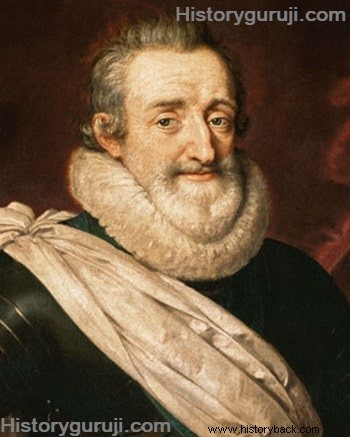
सोलहवीं शताब्दी में धार्मिक युद्धों से उत्पन्न अराजकता ने निरंकुश राजतंत्र को और बल प्रदान किया। हेनरी चतुर्थ ( 1589-1610 ई.) फ्रांस के इतिहास में महान् राजा के रूप में ही नहीं, लोकप्रिय राजा के रूप में भी प्रसिद्ध है। हेनरी चतुर्थ ने एक नये बूर्वो राजवंश की स्थापना की, जो दो सौ वर्षो तक फ्रांस पर शासन करता रहा। उसके सबसे महत्वपूर्ण कार्यो में एक था- राजाओं की शक्ति की प्रभुता को पुनः स्थापित करना।
हेनरी चतुर्थ के बाद 1617 ई. में बालिग होने पर लुई तेरहवें ने राज्य की बागडोर अपने हाथ में ली। लुई तेरहवें में प्रशासकीय क्षमता एवं योग्यता का अभाव था, किंतु सौभाग्य से उसे कार्डिनल रिशलू नामक एक असाधारण व्यक्ति की अमूल्य सेवाएँ प्राप्त थीं, जिसे उसने 1624 ई. में प्रधानमंत्री बनाया। रिशलू मृत्युपर्यंत (1642 ई.) अपने पद पर बना रहा। योग्य और ओजस्वी रिशलू के दो लक्ष्य थे-एक तो राजा को फ्रांस में संप्रभु बनाना, दूसरे फ्रांस को यूरोप में सर्वश्रेष्ठ बनाना। रिशलू ने सामंतों को नष्ट कर तथा काल्विनवादी प्रोटेस्टेंटों ‘ह्यूगनोटों’ का दमन कर राजा की निरंकुश सत्ता को स्थापित किया। इसके अलावा, रिशलू ने स्टेट्स जनरल की बैठक बुलाने से इनकार कर दिया, जिससे राजा मनमाना काम करने लिए स्वतंत्र हो गया। अब राजा को कानून बनाने, उन्हें लागू करने, कर लगाने और उन्हें खर्च करने का अधिकार मिल गया। इस प्रकार रिशलू निरंकुश राजतंत्र का प्रमुख निर्माता था।
रिशलू की मृत्यु के बाद अगले राजा लुई चौदहवें (1643-1715 ई.) की अल्पवयस्कता के समय, कार्डिनल मैजारिन ने 1661 ई. फ्रांस तक फ्रांस का कार्यभार सँभाला। उसने सामंतवाद को नष्ट करने और राजा की सत्ता को निरंकुश बनाने के लिए रिशलू की नीतियों को जारी रखा। रिशलू ने फ्रांस को शक्तिशाली बनाने के लिए कैथोलिक होकर भी तीसवर्षीय युद्ध (1618-1648 ई.) में प्रोटेस्टेंटों की ओर से हस्तक्षेप किया। लुई चौदहवें के काल में निरंकुश राजतंत्र अपने चरम पर पहुँच गया। लुई चौदहवाँ कहा करता था:‘‘मैं ही राज्य हूँ।’’ इस प्रकार रिशलू एवं मैजारिन के प्रयासों ने निरंकुश राजतंत्र को शक्तिशाली बना दिया। किंतु लुई सोलहवें (1774-1793 ई.) के समय होनेवाली फ्रांसीसी क्रांति ने फ्रांस में निरंकुश राजसत्ता का अंत कर दिया।
अन्य निरंकुश राष्ट्रीय राज्य
प्रशा

प्रशा का उत्थान भी सत्रहवीं एवं अठारहवीं सदी में हुआ। ब्रैडेनबर्ग की ड ची के आधार पर इसका विकास हुआ और एक साम्राज्य के रूप में परिवर्तित हो गया। सत्रहवीं सदी में फ्रेडरिक विलियम (1640-1688 ई.) प्रशा का शासक बना। उसे ‘‘इलेक्टर महान्’ भी कहा जाता था। फ्रेडरिक विलियम ने प्रशा को सुदृढ़ करने एवं निरंकुश राजतंत्र स्थापित करने के लिए प्रशासनिक सुधारों की शुरूआत की। उसने कृषकों को ऐसी जमीनों पर काम करने के लिए छः वर्ष तक करों से मुक्ति दी जो तीस वर्षीय युद्ध के कारण बंजर हो गई थी। उसने सरकारी नियंत्रण के अंतर्गत कारखानों को बढ़ावा दिया। निरंकुश राजतंत्र हेतु उसने एक विशाल सेना का संगठन किया और धीरे-धीरे प्रांतीय प्रशासन में लोकप्रिय स्टेट्स को नष्ट कर दिया। प्रशा के शासकों में फ्रेडरिक महान् (1740-1786 ई.) सर्वाधिक उल्लेखनीय है। उसके समय प्रशा का विकास चरम सीमा पर पहुँच गया।
पुर्तगाल
पुर्तगाल आरंभ में कैस्टील राज्य का भाग था जो 1095 ई. में कैस्टील राज्य से स्वतंत्र हो गया था। इसके बाद भी कैस्टील के राजा इसको हथियाने का प्रयस करते रहे। 1385 ई. में पुर्तगाल के राजा जान प्रथम ने अंग्रेज धनुर्धरों की सहायता से कैस्टील के राजा को अंतिम बार पराजित किया और स्वतंत्र पुर्तगाल राज्य की स्थापना की। इसके बाद पुर्तगाल में कई योग्य शासक हुए। इनमें हेनरी दि नेवीगेटर सबसे प्रसिद्ध है, जिसने समुद्री अभियानों और भौगोलिक खोजों को प्रोत्साहित किया। हेनरी की योजना के अनुसार ही वास्कोडिगामा केप आफ गुडहोप होते हुए भारत आया था। 1500 ई. तक पुर्तगाल अपने योग्य शासकों के प्रयत्नों, नवीन आविष्कारों एवं भौगोलिक खोजों के कारण यूरोपीय राजनीति में एक प्रमुख राष्ट्रीय राज्य के रूप में उभर चुका था। इधर, स्पेन के कैस्टील राजवंश से पुर्तगाली राजवंश की घनिष्ठता से लगता था कि दोनों राज्यों का एकीकरण कभी भी हो सकता है। इस संभावना को 1580 ई. में स्पेन के शासक फिलिप द्वितीय ने पुर्तगाल को स्पेन में विलीन कर यथार्थ रूप दे दिया।
जर्मनी
यूरोप के इतिहास में पवित्र रोमन साम्राज्य का अत्यंत महत्वपूर्ण स्थान है। प्रारंभ में पवित्र रोमन साम्राज्य के अंतर्गत मध्य एवं पश्चिमी स्पेन, पोलैंड, इटली, बर्गंडी एवं हंगरी आदि राज्य थे, किंतु बाद में उन्होंने पवित्र रोमन साम्राज्य से अपने को स्वतंत्र कर लिया। पंद्रहवीं शताब्दी के उत्तरार्द्ध में जर्मनी साम्राज्य ही पवित्र रोमन साम्राज्य था। यद्यपि पवित्र रोमन साम्राज्य का सम्राट धार्मिक दृष्टि से यूरोप में सर्वोच्च माना जाता था, किंतु उसकी राजनीतिक स्थिति अच्छी नहीं थी। जर्मनी प्रायः 300 छोटी-बड़ी रियासतों में विभक्त था, जो एक-दूसरे के प्रति ईर्ष्या रखते थे। जर्मनी का सम्राट यद्यपि सर्वोच्च अधिकारी था, किंतु वास्तव में वह अत्यंत कमजोर था तथा सामंतों पर नियंत्रण रखने में असमर्थ था। यही कारण है कि जब पश्चिमी यूरोप के विभिन्न राज्यों में राष्ट्रीय राजतंत्रों की स्थापना हो रही थी, जर्मनी इस दौड़ में अत्यंत पिछड़ गया।
15वीं शताब्दी के उत्तरार्द्ध में जर्मनी में भी राष्ट्रवादी भावनाएँ प्रबल होने लगीं। समय हैप्सवर्ग वंश जर्मनी में सर्वाधिक शक्तिशाली था तथा इसी वंश के राजकुमार काफी समय से जर्मनी के सम्राट बनते आ रहे थे। 1493 ई. में इसी वंश का मैक्सिमिलियन जर्मनी का सम्राट बना। उसने 1519 ई. तक जर्मनी में शासन किया। किंतु मैक्सिमिलियन के सुधार सामंतों की स्वार्थपरता एवं सम्राट के पास स्थायी एवं शक्तिसंपन्न सेना के अभाव में कारगर सिद्ध नहीं हो सके। यद्यपि मैक्सिमिलियन ने नीदरलैंड्स की राजकुमारी से स्वयं विवाह किया और अपने पुत्र फिलिप प्रथम का विवाह स्पेन की राजकुमारी जोआना से किया, किंतु पवित्र रोमन साम्राज्य अथवा जर्मन साम्राज्य के राष्ट्रीय एकीकरण की दिशा में कोई विशेष प्रगति नहीं हो सकी।
इटली
मध्य युग की समाप्ति के समय इटली में एकता का पूर्ण अभाव था। इटली अनेक राज्यों में विभक्त था जो परस्पर वैमनस्य के कारण सदैव झगड़ते थे। इटली के राज्यों की पारस्परिक फूट का लाभ उठाकर यूरोप के अन्य राज्य इटली पर अधिकार करने का प्रयत्न करने लगे थे। इटली पर अधिकार करने के लिए फ्रांस व स्पेन विशेष रूप से उत्सुक थे। इटली यद्यपि अनेक राज्यों में विभक्त था, किंतु प्रमुख पाँच राज्य मिलान, वेनिस, फ्लोरेंस, नेपल्स और रोम थे।
तुर्की
15वीं शताब्दी के प्रारंभ में तुर्कों ने पवित्र रोमन साम्राज्य के पूर्वी भागों पर अधिकार करना आरंभ कर दिया। 1453 ई. में मुहम्मद द्वितीय ने कुस्तुन्तुनिया पर भी अधिकार कर लिया। इस प्रकार पूर्वी रोमन साम्राज्य का पतन हो गया। बाद में मुहम्मद द्वितीय के पौत्र सिलिम ने ईरान, सीरिया तथा मिस्र पर भी विजय प्राप्त की। इस प्रकार एक विशाल तुर्क-साम्राज्य की स्थापना हुई। सिलिम की मृत्यु 1590 ई. में हुई। उसके पश्चात् उसके पुत्र सौलिमन के समय में तुर्क-साम्राज्य उन्नति की चरम सीमा पर पहुँच गया।
रूस
आधुनिक काल की पूर्व संध्या पर रूस एक सुदृढ़ केंद्रीय शक्ति से रहित था और वह आंतरिक सामंतीय संघर्षों एवं डेनमार्क, नार्वे के आक्रमणों एवं तातारों की विजय के कारण एक कमजोर एवं प्रभावहीन राज्य था। सोलहवीं शताब्दी में पुनर्जागरण की जो लहरें पश्चिमी यूरोप में प्रवाहित हो रही थी, रूस उन परिवर्तनों से अछूता रहा। उसका यूरोप के देशों में कोई संबंध नहीं था। वह लंबे समय तक पिछड़ा हुआ राज्य बना रहा।
किंतु सोलहवीं सदी के आरंभ में, ईवान महान् (1492-1505 ई.) ने रूस की यथास्थिति को समाप्त किया और रूस को एक राष्ट्रीय राज्य के रूप में अग्रसर करने का महत्वपूर्ण कार्य किया। उसने सर्वप्रथम तातार मुसलमानों की सत्ता का अंत किया एवं रूस में मस्कोवी निरंकुश साम्राज्य की स्थापना की। उसने पहले-पहल जार की उपाधि धारण की, जिसका रूसी भाषा में अर्थ है- सर्वोच्च सत्ताधारी स्वतंत्र शासक। ईवान महान् के पश्चात् ईवान भयंकर (1505-1584 ई.) ने जारशाही की शक्ति में पर्याप्त वृद्धि के साथ ही रूसी सीमा का विस्तार भी किया। इस प्रकार 16वीं शताब्दी के आरंभ में ईवान ने रूस को उत्कर्षरत राष्ट्रीय राज्यों की पंक्ति में लाकर खड़ा कर दिया।
ईवान भयंकर की मृत्यु (1584 ई.) के पश्चात् रूस में 1613 ई. तक का काल गृहयुद्ध एवं अराजकता का रहा। 1613 ई. में इस दुव्र्यवस्था का अंत करने के उद्देश्य से रूसी समांतों ने परस्पर सहमति से सोलह वर्षीय माइकेल रोमानोम को जार पद पर नियुक्त किया। इस वंश का शासन रूसी क्रांति (1917 ई.) तक चलता रहा।
बोहेमिया, हंगरी, पोलैंड तथा लिथुआनिया
परंपरागत रूप में बोहेमिया पवित्र रोमन साम्राज्य का अंग माना जाता था। बोहेमिया में राजा का निर्वाचन होता था, इसलिए राजनीति में अपना प्रभुत्व स्थापित करने के लिए सामंतवर्ग विदेशी राजकुमारों को ही अपना राजा चयनित करते थे। इस प्रथा ने बोहेमिया को विदेशी शक्ति हंगरी के अधीन कर दिया, परंतु तब भी अनेक विषमताओं के कारण हंगरी में राष्ट्रीय राज्य की स्थापना नहीं हो सकी। 1547 ई. में तो तुर्कों की विजय ने हंगरी का विभाजन ही कर दिया।
पोलैंड एवं लिथुआनिया ने पवित्र रोमन साम्राज्य से अपने को स्वतंत्र करने की घोषणा तो कर ली थी, किंतु सामंतों के पारस्परिक विरोध के कारण वहाँ भी राष्ट्रीयता के विकास में बाधा पड़ी।
नार्वे, डेनमार्क एवं स्वीडन
नार्वे, डेनमार्क एवं स्वीडन उत्तर-पश्चिमी यूरोप के तीन प्रमुख राज्य थे। 1397 ई. से नार्वे एवं स्वीडन में भी डेनमार्क के राजा का शासन चला आ रहा था। 1523 ई. में स्वीडन ने स्वतः को डेनमार्क से स्वतंत्र करा लिया, किंतु नार्वे पर डेनमार्क का ही प्रभुत्व बना रहा। 16वीं शताब्दी के आरंभ में डेनमार्क, नार्वे एवं स्वीडन निरंकुश राजतंत्र की स्थापना की ओर अग्रसर होने लगे थे।
इस प्रकार संपूर्ण यूरोप के इतिहास में 16वीं शताब्दी के आरम्भ में जहाँ एक ओर पश्चिमी यूरोप में नवीन एवं शक्तिशाली राजतंत्रों का द्रुतगति से विकास हो रहा था, वहीं दूसरी ओर दक्षिणी-पूर्वी एवं मध्य यूरोप में अप्रगतिशील राज्यों का अस्तित्व दृष्टिगोचर होता है।
राष्ट्रीय राज्यों का पतन
दुर्भाग्य से राष्ट्रीय राज्यों के उदय से यूरोप में शांति स्थापित नहीं हो सकी। मध्यम वर्ग द्वारा समर्पित राष्ट्रीय राजाओं ने सामंती युद्धों को समाप्त करने तथा आंतरिक शांति और व्यवस्था के नाम पर युद्ध किया। परंतु सामंती युद्धों के बाद राष्ट्रीय और वंशानुगत युद्धों की शुरूआत हुई। युद्धों में बढ़ते व्यय ने सभी देशों में कर को अधिकाधिक बढ़ा दिया जिसके कारण राजतंत्रीय राज्यों का समाज की नवोदित शक्तियों के साथ संघर्ष आरंभ हुआ।
अठारहवीं शताब्दी के उत्तरार्द्ध में लोकप्रिय सरकारों की माँग ने भी निरंकुशता की जड़े कमजोर कीं। जनता ने अनुचित कानूनों तथा राजा के असीमित अधिकारों का विरोध करना प्रारंभ कर दिया। विरोध करनेवालों में समाज के वे हिस्से भी शामिल थे, जिन्होंने पहले शक्तिशाली राजाओं का समर्थन किया था। अब जनता ने शासकों के निरंकुश अधिकारों में कटौती तथा राजसत्ता में हिस्सा देने की माँग शुरू की। शासकों और जनता का परस्पर-विरोध सबसे पहले इंग्लैंड में सामने आया। इसके बाद अमेरिका की क्रांति एवं फ्रांस की क्रांति ने निरंकुशता को एक जोरदार धक्का दिया।
राष्ट्रीय राज्यों के उदय से कुछ अच्छे परिणाम भी सामने आये। सामंतवाद समाप्त हुआ, आर्थिक विकास के कारण उत्पादन बढ़ा, तकनीकी क्षेत्र में नवीन प्रणालियाँ खोजी गई। अब राष्ट्रों की सीमाएँ भी अधिकाधिक निश्चित और तर्कसंगत हो गई और सबसे बड़ी बात यह कि आज की राष्ट्रीय चेतना कल के निरंकुशवाद की ही देन है।
